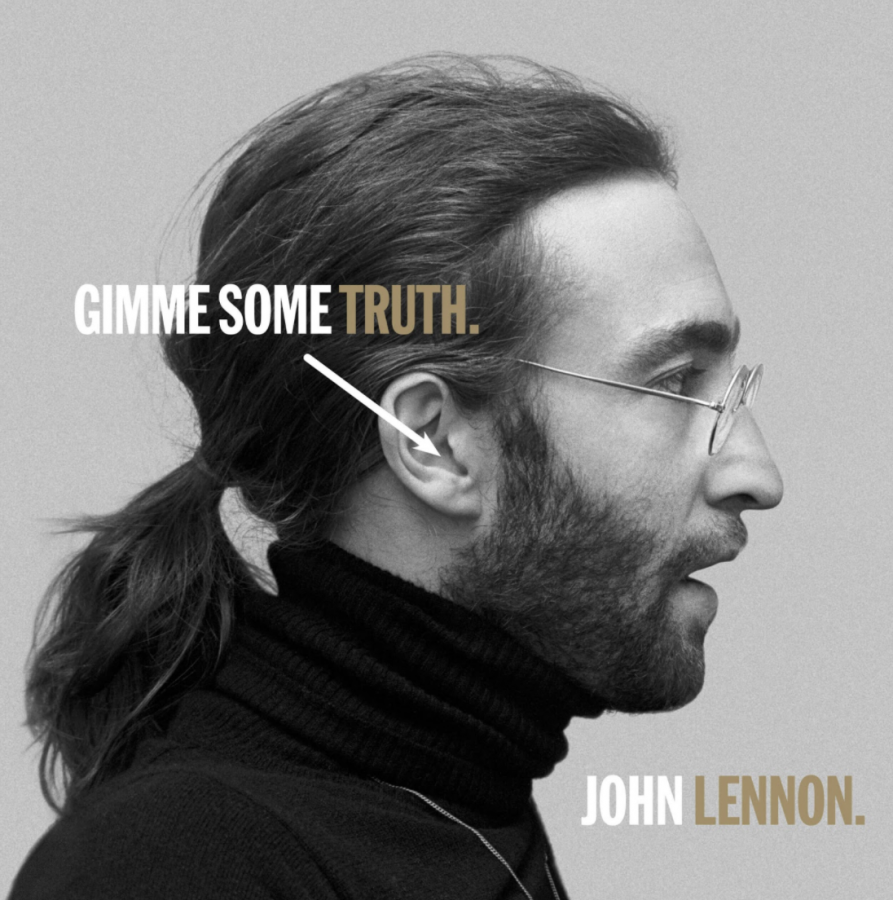“Gimme Some Truth” celebrates 80 years of John Lennon
Courtesy of Universal Music Group
“Gimme Some Truth” celebrates 80 years of John Lennon
October 9, 2020
Oct. 9, 2020 marks what would’ve been the 80th birthday of one of the most influential artists of the 20th century: John Lennon. Much of Lennon’s life has been mythologized through the years, from his founding of the Beatles to his tragic death. However, through it all, Lennon created some of the most innovative and beloved music of the ‘60s and ‘70s which ultimately transformed the music industry forever.
Lennon founded the band that would become the Beatles in 1956 at the age of 16, with Paul McCartney and George Harrison shortly joining thereafter in 1957 and 1958, respectively, and Ringo Starr joining in 1962. Together, the four men would form the highest-selling and most critically acclaimed musical act in history, with each new Beatles album setting a standard for what music could be in the ‘60s. Though the group initially started with feel-good love songs like “She Loves You” and “I Want to Hold Your Hand,” Lennon’s songwriting partnership with Paul McCartney evolved substantially during his time with the Beatles. The band transitioned from its initial pop focus, to folk rock, to psychedelic rock, into what would eventually become classic rock––with the partnership remaining one of the most successful in songwriting history.
The maturation of Lennon’s songwriting style can clearly be seen with each new album, as he went from writing songs like “Do You Want to Know a Secret” and “A Hard Day’s Night” to songs like “Help,” “In My Life,” “Tomorrow Never Knows,” “Strawberry Fields Forever,” “A Day in the Life,” “I Am The Walrus,” “Happiness is a Warm Gun,” “Don’t Let Me Down” and “I Want You (She’s So Heavy),” as time went on. What’s even crazier is that all this music came out within the span of eight years, marking an extremely prolific period. Albums like “Rubber Soul,” “Revolver,” “Sgt. Pepper’s Lonely Hearts Club Band,” “The Beatles (The White Album)” and “Abbey Road” are still considered some of the greatest of all time and remain landmarks of music history. Even as Lennon and McCartney’s partnership transitioned into more of a rivalry in the later albums, the Beatles continued to raise the bar for what music could sound like, what it could mean and what it could be.
But of course nothing can last forever––even the Beatles. Almost as sudden as their arrival and the ensuing “Beatlesmania,” the band broke up due to a variety of personal and business reasons, leaving Lennon as a solo artist. In the ensuing decade, Lennon would release several critically acclaimed albums, like “John Lennon/Plastic Ono Band” and “Imagine,” as well as a few not so great ones, before going on hiatus for five years in order to raise his youngest son, Sean Lennon. After his self-imposed hiatus, Lennon would release one more album, “Double Fantasy,” just weeks before being shot down in the streets of New York City in Dec. 1980.
It’s those solo years of music that the new compilation album, “Gimme Some Truth,” contains. Released on what would’ve been Lennon’s 80th birthday, the album features new “ultimate mixes” of 36 classic Lennon songs, which span his entire solo career and were handpicked by his wife Yoko Ono and his son Sean. After his 40 years of life and now 40 years of death, Lennon’s legacy can truly be unpacked through his music now, with remixes that bring his songs into the modern age. The compilation brands Lennon as a political revolutionary with a soft spot, as it contains protest songs, love songs and songs about his general feelings.
Some favorites include the song the album takes its name from, “Gimme Some Truth,” which decries the hypocrisy and dearth of lies coming from the Richard Nixon presidency at the time, and those messages couldn’t be more timely now. Other politically charged songs from Lennon are included, with “Working Class Hero,” “Give Peace a Chance” and “Power To The People” also making great rallying cries. Lennon’s love songs may not be as sweet and silly as McCartney’s generally were, but they still have their own iconic qualities in songs such as “Jealous Guy,” “Oh Yoko! and” “Love.” The songs “Woman” and “(Just Like) Starting Over” from his last album also strike me as some of his most sincere love songs. Two other songs included from Lennon’s last album, “Watching The Wheels” and “Beautiful Boy,” indicate Lennon’s acceptance of his middle age as he simmers down and becomes more optimistic for the future––making his subsequent murder all the more tragic. But it’s in his more reflective songs that Lennon truly stands out, such as with “God,” where Lennon tries to pin down his individualistic spiritual beliefs and decides, in essence, that we all are God. “Instant Karma! (We All Shine On)” may come off as an energetic bop, but in reality, it’s a treatise on the causality of our actions. Then, of course, there is “Imagine,” perhaps one of the most well-known songs on Earth, which envisions a world united by common love, free of pain and suffering.
All these tracks sound better than ever and are accompanied by a deluge of other songs that are unmistakably Lennon. Treat yourself by giving it a listen and by reflecting on the legacy of one of the greatest rock stars and songwriters in modern history.



